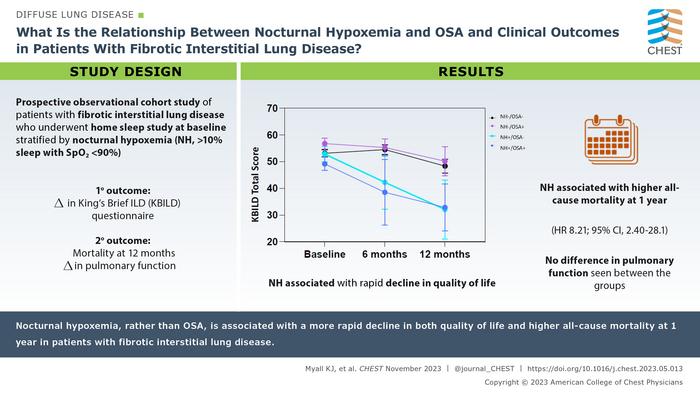Glenview, Illinois – Published monthly, the journal CHEST® features peer-reviewed, cutting-edge original research in chest medicine: Pulmonary, critical care and sleep medicine and related disciplines. Journal topics include asthma, chest infections, COPD, critical care, diffuse lung disease, education and clinical practice, pulmonary vascular disease, sleep, thoracic oncology and the humanities.

Credit: Myall KJ, et al. CHEST November 2023
Glenview, Illinois – Published monthly, the journal CHEST® features peer-reviewed, cutting-edge original research in chest medicine: Pulmonary, critical care and sleep medicine and related disciplines. Journal topics include asthma, chest infections, COPD, critical care, diffuse lung disease, education and clinical practice, pulmonary vascular disease, sleep, thoracic oncology and the humanities.
The November issue of the CHEST journal contains 48 articles, including clinically relevant research, reviews, case series, commentary and more. Each month, the journal also offers complementary resources, including visual abstracts, podcasts and more to summarize and share expert commentary on select research.
“The 2023 Canadian Thoracic Society guideline on pharmacotherapy in patients with stable COPD is published in this month’s issue of [the journal] CHEST,” says Editor in Chief of the journal CHEST, Peter Mazzone, MD, MPH, FCCP. “This guideline provides updated recommendations based on newly published literature since the 2019 guideline, Canadian Thoracic Society Clinical Practice Guideline on pharmacotherapy in patients with COPD – 2019 update of evidence. Read the latest guideline.”
Additional highlights from the latest issue of the journal CHEST include:
-
Asthma
In a post hoc comparison using data from 2,436 patients, “Clinic vs Home Spirometry for Monitoring Lung Function in Patients With Asthma” showed that home spirometry was less consistent than and lacked agreement with clinic spirometry. View the visual abstract for this research.
-
COPD
Original research, “CT Imaging With Machine Learning for Predicting Progression to COPD in Individuals at Risk,” suggests that identifying individuals at risk of COPD progression may allow for initiation of treatment to potentially slow the progression of the disease. -
Diffuse Lung Disease
A prospective observational cohort study, “Nocturnal Hypoxemia Associates With Symptom Progression and Mortality in Patients With Progressive Fibrotic Interstitial Lung Disease,” finds that prolonged nocturnal hypoxemia is associated with worsening disease-related quality of life and increased mortality in patients with fibrotic interstitial lung disease. View the visual abstract for this research. -
Thoracic Oncology
“Prospective Detection of Early Lung Cancer in Patients With COPD in Regular Care by Electronic Nose Analysis of Exhaled Breath” shows that electronic nose assessment may detect early stages of lung cancer in patients with COPD.
To view the entire November issue of the CHEST journal, visit journal.chestnet.org, and follow @journal_CHEST on social media for the latest journal news.
About the American College of Chest Physicians
The American College of Chest Physicians® (CHEST) is the global leader in the prevention, diagnosis and treatment of chest diseases. Its mission is to champion advanced clinical practice, education, communication and research in chest medicine. It serves as an essential connection to clinical knowledge and resources for its 22,000+ members from around the world who provide patient care in pulmonary, critical care and sleep medicine. For information about the American College of Chest Physicians, and its flagship journal CHEST®, visit chestnet.org.
Journal
the journal CHEST




